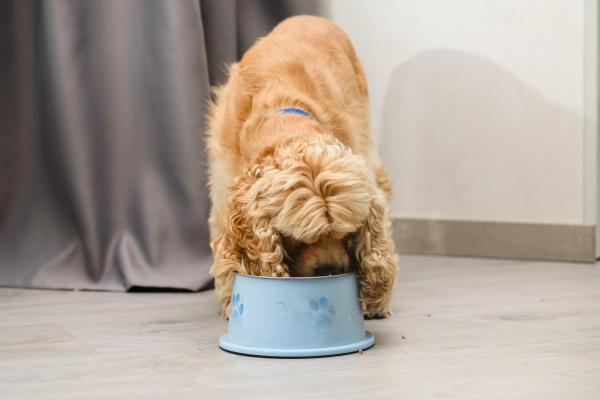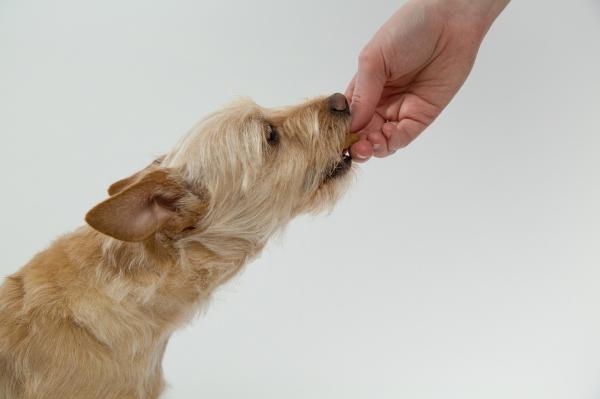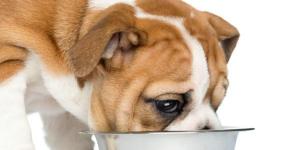Diet for Dogs With Pancreatitis



See files for Dogs
The pancreas is a small but very important organ. Its main function is to secrete digestive enzymes and other substances that help in the absorption of nutrients, vitamins and minerals. It is also responsible for the production of hormones that are extremely important for the regulation of a dog's metabolism, including insulin and glucagon [1]. Pancreatitis is an inflammation of the pancreas, resulting in damage to pancreatic tissue. The disease can be acute or chronic. In mild cases, there are few changes in the organ's vascular functioning and other organs are not affected. Chronic pancreatitis can have severe systemic repercussions.
Your veterinarian will need to diagnose and prescribe treatment for pancreatitis in dogs. In mild cases, food plays a vert important role and they will provide a diet for dogs with pancreatitis. AnimalWised provides answers for guardians wondering what can dogs with pancreatitis eat?
Types of pancreatitis in dogs
Before we provide a specific diet for dogs with pancreatitis, we need to know a little background on the disease. In acute canine pancreatitis, the clinical symptoms can range from mild to severe. They may affect the organ's vascular function resulting in symptoms such as vomiting, diarrhea, inappetence and back and/or abdominal pain. Acute pancreatitis can be fatal if not diagnosed and treated in time.
Chronic pancreatitis is characterized by inflammation which may present gradually, asymptomatically or periodically. In these cases, the organ presents irreversible changes, resulting in pain and eventual permanent loss of its function[2]. The vascularization of the pancreas is severely altered, changes in other organs may be observed, and the condition tends to worsen progressively[3].
Several studies have attempted to find a universal and multidisciplinary classification of the various forms of pancreatic inflammation, as well as aid early diagnosis of the disease[4]. Since pancreatitis in dogs has similar symptoms to several other gastroenteric pathologies, diagnosis is not always easy. Physical examination, anamnesis (medical history assessment), laboratory analysis, imaging tests and more may be required for diagnosis.
Prevalence of pancreatitis in dogs
As stated above, diagnosing pancreatitis in dogs can be difficult. For this reason, it can be helpful to look at which dogs are more predisposed to the disease. Dogs most likely to be affected by pancreatitis include:
- Middle-aged and older animals
- Neutered dogs
- Females
- Obese and overweight dogs
- Dogs with a high-fat or poor diet
Some researchers claim that certain breeds are more prone to pancreatitis than others. These breeds include Miniature Schnauzers, different types of Poodles and Cocker Spaniels. Despite this research, it is important to note that any dog can develop pancreatitis.
Diet for dogs with pancreatitis
As asserted above, canine pancreatitis needs to be diagnosed by a veterinarian who will then establish treatment. This treatment involves various stages. Providing the right diet for a dog with pancreatitis can be both preventive and curative, depending on the extent of organ failure. It is something which needs to be carried out by the guardian at home.
There are various commercial feeds for dogs with pancreatitis currently available. The formulas of these feeds are balanced to contain the right levels of protein, carbohydrates and fat. Such a balance helps to provide the dog with sufficient energy without harming the pancreas further and helping it to recover. These feeds can be either dry or wet. The latter is easier to feed dogs which may be resistant to dietary changes.
Availability of brands with dog food formulated for pancreatitis differs according to region. We recommend choosing the one recommended by the veterinarian. It should use natural, quality ingredients, ideally of such good quality they are suitable for human consumption. We will also need to consider the dog's ability to eat since older dogs are more affected by pancreatitis and often have difficulty ingesting certain foods.
Homemade food for dogs with pancreatitis
If your dog does not accept commercial feed for dogs with pancreatitis, you can prepare food at home. We will always need to do this under the guidance of our veterinarian as they will be able to assess the individual dog's needs and avoid nutritional deficiencies.
The homemade diet for dogs with pancreatitis should have high-quality protein from a single source. This means we should not mix different meats together when making their meals. This will assist in better functioning of the pancreas which is our main goal when providing this type of diet.
In addition to single-source protein, carbohydrates should be of high quality, as well as gluten-free and lactose-free if possible. Fat must be absent or in extremely low amounts. Avoid high-fat, high-carbohydrate foods like bread and try to avoid commercial treats like leather bones or pig ears[5]. It is preferable to choose homemade treats with the nutritional elements mentioned.
The nutritional ratio of a diet for dogs with pancreatitis should be the following:
- 25% protein
- Less than 5% fat
- c. 5% carbohydrates
- 65% water [6]
You can use meat or vegetable broth for the water portion. However, this needs to be made at home since commercial stocks will use garlic, salt and other additives which are forbidden food for dogs.
Is pancreatitis in dogs curable?
Although pancreatitis in dogs is curable, the outcome of the disease will depend on several factors, especially early diagnosis and treatment. As soon as any abnormalities in physicality or behavior are observed, we should take the dog to a veterinarian. If the dog is experiencing abdominal pain, it is considered a medical emergency. They will likely need to be stabilized with intravenous hydration and feeding.
If treatment is not instituted in time, the animal can die or develop chronic pancreatitis. If the dog survives, they are likely to have irreversible damage to the pancreas, even resulting in the dog becoming diabetic. Some dogs will have to eat therapeutic diets for the rest of their lives or use a balanced homemade diet for dogs with pancreatitis.
How to prevent canine pancreatitis
In the majority of cases, the exact cause of pancreatic inflammation will not be known. We can consider some general factors which will help reduce the chances of developing canine pancreatitis. For example, avoiding fatty foods is particularly helpful in this regard.
Foods to avoid in dogs with pancreatitis:
- Fatty treats
- Leather bones
- Pizza
- Fatty meats
- Cheese
- Bread
- Sauces
- Chicken skin
Dogs that have an unbalanced homemade diet or that often eat fatty snacks are more likely to develop pancreatitis and may also suffer the consequences of obesity.

General care for dogs with pancreatitis
Guardians providing a diet for dogs with pancreatitis should always remain alert to signs of the disease progression. For example, if the dog begins to have difficulty standing up or lying down, it can indicate abdominal pain. This is also seen in dogs which continuously lean down in the prayer position as this is something which can help relieve pain. We should also check their stools, watch out for hypersalivation and generally be vigilant to change.
We always have to offer fresh water. It is important to ensure they are properly hydrated. If they show signs of dehydration, you can provide a homemade solution for a dehydrated dog. Never give coconut water to a dog with pancreatitis as it is high in fat.
Under no circumstances should you treat the condition yourself. Always rely on your veterinarian to make the correct diagnosis and start treatment as soon as possible. Remember that pancreatitis can be a medical emergency and waiting can result in death.
Now that you know what to feed a dog with pancreatitis, you may be interested in the following video in which we talk about the BARF diet. This is a homemade diet which may be suitable for dogs with pancreatitis if you have checked with your veterinarian:

If you want to read similar articles to Diet for Dogs With Pancreatitis, we recommend you visit our Healthy diets category.
1. Marcato, J. A. (2010). Pancreatitis in dogs. Graduation work in Veterinary Medicine, Federal University of Rio Grande do Sul.
2. Tognoli, G. K., & Carvalho, M. S. (2019). Diagnosis and treatment of pancreatitis in dogs. Graduation work in Veterinary Medicine, UNICEPLAC. <https://dspace.uniceplac.edu.br/handle/123456789/199>. Retrieved June 14, 2022.
3. Sousa, F.G. (2021). Canine pancreatitis: The danger in the routine of veterinarians: Review. PubVet, 15(3), 168.
4. Cardoso, C. F. B. G. (2015). Approach to canine and feline pancreatitis: from clinical diagnosis to histopathological diagnosis . Graduation work in Veterinary Medicine, University of Lisbon.
5. Anteriormente, A. D. R. (2019). Canine pancreatitis and the importance of proper nutrition. 29th Brazilian Congress of Animal Science.
- Rondelli, M. C. H. (2019). Medical-Nutritional Management of Acute Pancreatitis in Dogs: Case Report. Animalium nucleus . v.1, no.1. Retrieved June 14, 2022.






